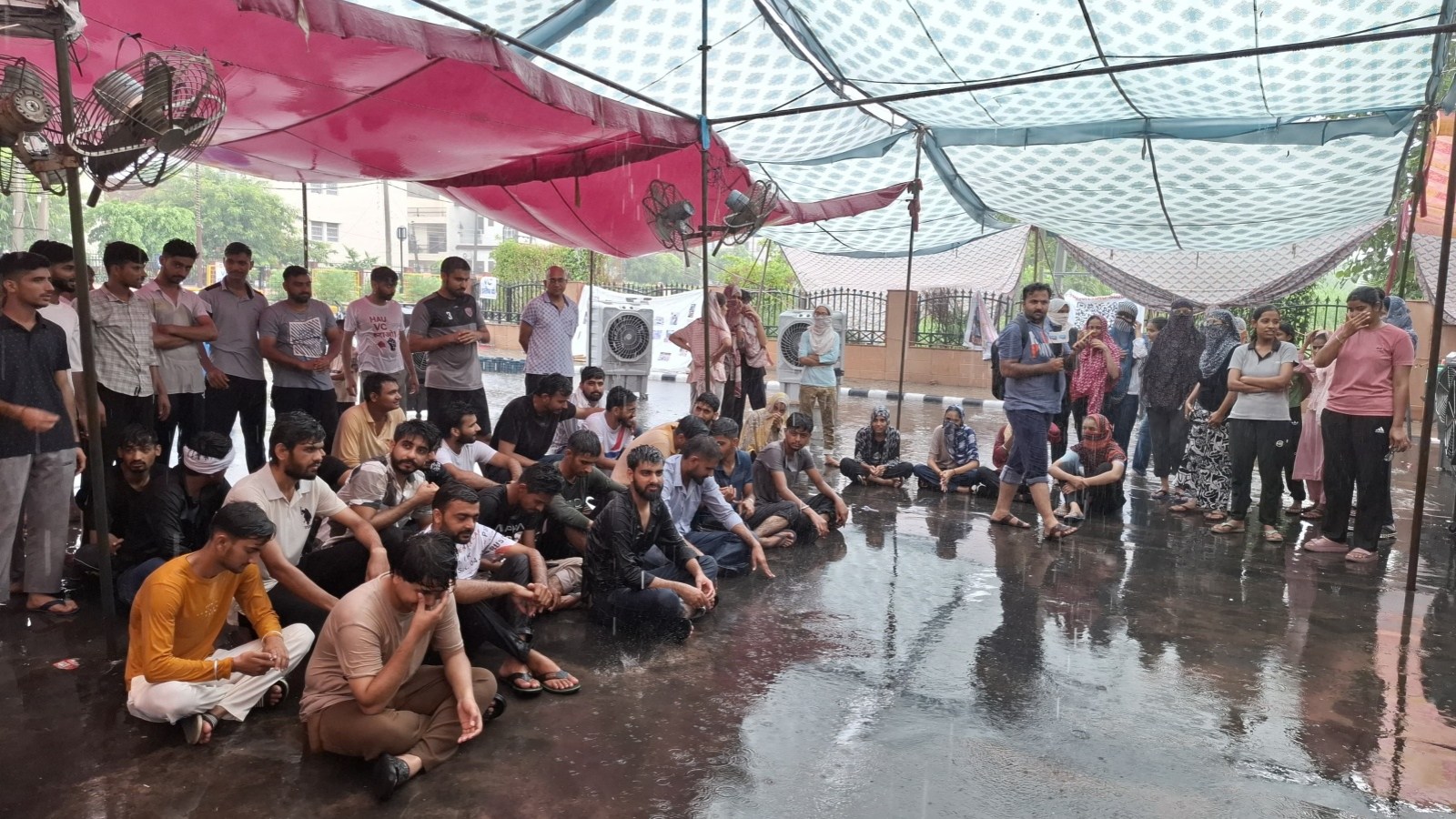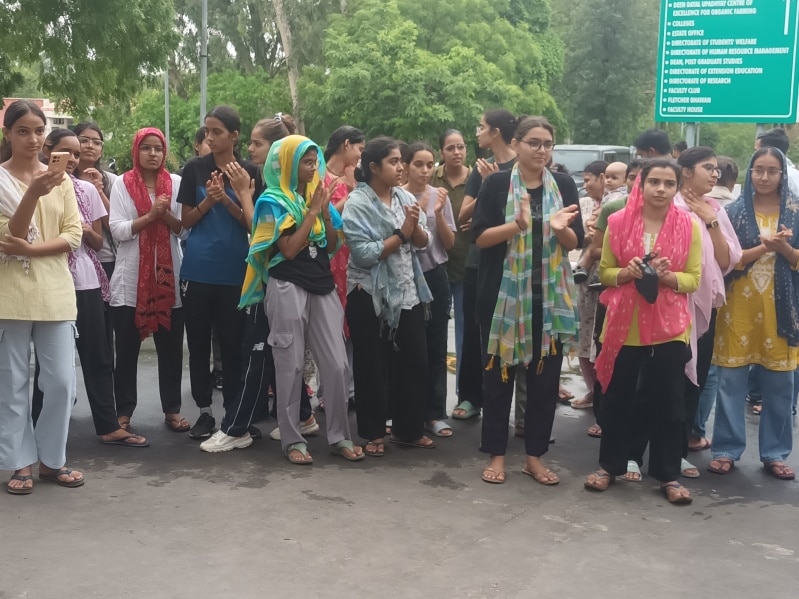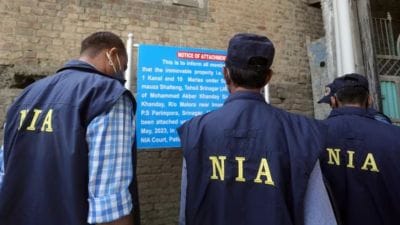Meals stopped, hostels being vacated, still students’ protest intensifies in HAU Hisar
Students demand action against officials involved in assaulting students, resignation of V-C
 Haryana agriculture university students staging a protest in front of the university during rains (Ashok Kundu)
Haryana agriculture university students staging a protest in front of the university during rains (Ashok Kundu)Heavy showers, three times on Monday, did not deter senior and junior students studying at Chaudhary Charan Singh Haryana Agricultural University (CCSHAU), Hisar, and hundreds of her fellow students, from sitting firm on dharna outside one of Asia’s largest agricultural universities. Their demand: action against officials accused of assaulting students during a protest on June 10, and the resignation of Vice-Chancellor (V-C) Dr B R Kamboj.
The agitation, one of the most significant student movements in Haryana in recent years, has intensified with hostel meals stopped, students being told to vacate rooms, and police calling parents and village sarpanchs to dissuade participation.
“They’re trying to scare us. The police told my family I might get arrested. Hostel wardens are calling parents to take their children home,” Kirti, an MSc student, said. “But we’re not afraid. Many of us missed exams. Now even food has been stopped.”
PhD student Nikita confronted university officials on June 27 after mess services were halted. “We are standing hungry in front of you. Why has our food been stopped? What is our crime?” she asked. In response, Dr S K Pahuja, Director of Students’ Welfare (DSW), said hostel evacuations were planned for post-exam repairs.
 Haryana agriculture university students staging a protest in front of the university. (Sukhbir Siwach)
Haryana agriculture university students staging a protest in front of the university. (Sukhbir Siwach)
The superintendent of police, Shashank Sawan, said police calls to parents were precautionary, citing unauthorised male movement near girls’ hostels. He added the move was initiated by the university administration.
Yet students remain unmoved. “We came here to study,” Shreya Singh, a first-year BSc student, said. “But we saw even first-year students being assaulted.”
Support has poured in from farmers, senior opposition leaders and families. Advocate Gurmel Singh, Shreya’s father, visited the site to show solidarity.
In a remarkable act of defiance, 397 students signed a petition in blood to show their unity. “We signed in blood,” said Hemant Yadav, one of the protesters. “Anyone who speaks out in front of a camera is targeted. But the support from society is our strength.”
Allegations of assault
The agitation began with a protest on June 10 against changes in stipend eligibility, when university officials and guards allegedly launched two baton charges. Dipanshu, a first-year BSc student who received nine stitches on his head, stated in his police complaint: “At 10:15 pm, as we sat near the V-C’s residence, his car arrived. Following his instructions, Registrar Pawan Kumar, Professor Radhe Shyam, Chief Security Officer Sukhbir Singh, and university guards attacked us with sticks”.
On June 15, Assistant Professor Radhe Shyam was arrested. His bail plea was rejected on June 27 by Additional Sessions Judge Madhulika, who called the charges “quite serious” and observed that granting bail could lead to tampering with evidence or flight from justice.
Government’s stand unclear
On June 25, students spoke to State Education Minister Mahipal Dhanda and claimed the government had agreed to send the V-C on six-month leave and take action against the accused. But so far, no such decision has materialised.
“There is a view in higher circles that the Vice-Chancellor was not directly involved in the baton charge,” a senior government official told The Indian Express. “Also, the government does not want to set a precedent of removing a Vice-Chancellor merely at the demand of a group of students.”
The stipend controversy
The protest began over changes to postgraduate and PhD stipend eligibility. Students allege these cuts jeopardise their academic futures. Dr Rajbir Garg, Director (Research) and chair of the coordination committee on the issue, said: “Due to financial constraints, the academic council decided to grant scholarships to only the top 25 students. If everyone gets it, there’s no competition.”
LDV reservation policy under fire
Students have also opposed the proposed amendment to the Land Donation Village (LDV) reservation policy, which currently grants admission preference to students from villages that donated land to the university. University officials clarified that the policy was being revised to offer this benefit only once per village per course level to allow broader access. But students argue this change could unfairly exclude villages when no new applicants come forward in a given year.
What next?
With students calling for a university shutdown on July 2, the administration is under growing pressure. The two key decisions — on stipends and LDV reservation — have been put on hold for now. But the core demands remain: action against the accused and the Vice-Chancellor’s resignation.
As political heat builds and rain continues to lash the city, the students have made one thing clear: they are not leaving. “We came for degrees,” Shreya said, “but we’re now fighting for dignity.”








